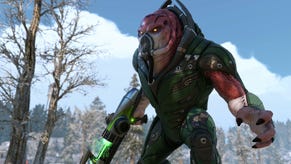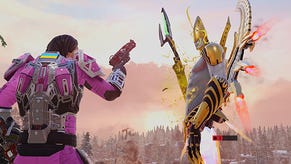Hands On (Safety Off): XCOM - Enemy Unknown
And the Earth died screaming
It’s Alec who normally brings you the latest on Firaxis’ XCOM remake so I expect you shall be somewhat confused to hear that I actually played it last week. Alec will probably never forgive me for taking what he saw as his rightful place but he was too busy being rained on in Greece to defend the Earth from invasion. I didn’t manage to protect anyone from the invasion either but I did cause a few soldiers to die trying. They might have specialisations and there might be less of them per squad, but the poor sods are as vulnerable as ever. This is how they died.
The first object of extraterrestrial origin has cracked our planet’s thin shell, or at least its concrete overlay, screaming from the skies and thumping through the surface of a city street. Onlookers are terrified, then curious, and soon either dead or dying. There’s something inside that thing, something with thoughts and feelings of its own. All signs point to those thoughts being bent toward the probing of brains and bottoms, all indications are that its feelings aren’t of picnics in a meadow, kissed by a light summer breeze.
Military intervention is called for and the poor chumps end up as dead as the civilians they were supposed to rescue. Time to gather Earth’s best and brightest, time to send in the elite, time to put a sad-eyed excuse of a man in charge of the last line of defense. A stirring sequence informed me that I was now Earth’s only hope, the commander of the newly formed XCOM Initiative. Yes, yes, I wanted to say, I’ve been doing this since the nineties. But, of course, they didn’t know that. They were going to show me the ropes.
My four man (three men and a lady to be precise) squad were on the ground, approaching the object, which was surrounded by wreckage and tendrils of smoke. My second in command, back at the base with me, told me to get them into cover and a glowing trail appeared on the screen, showing me exactly how to get them into cover. OK. Why not have them go into overwatch and keep an eye on the door of that building, he then suggested, overlaying more glowing waypoints describing precisely how to do that.
Move to the boundaries of what is permitted with the first phase of action, a circumference clearly marked around the operative, but do not go beyond it into the second marked zone. That would be dashing, which leaves a soldier incapable of firing, hunkering down for defense or, as I was about to perform, watching an area, finger on trigger, ready to fire.
It’s when we got inside the building, crashing through windows dramatically, that everything went pear-shaped. One soldier, a German, had survived but now his eyes were all glowy and weird, he was rasping and gurgling horrifying pleas for help. Some bloody sectoid was controlling his mind, that’s what I reckoned, but I dutifully followed the instructions, moved in close and tried to disarm him. He blew himself and one of my operatives to bits and there it was, cowering in the shadows, the little gray sod that had been ticking his brain stem. Helpful/obtrusive instructions continued to tell me what to do but only one of my squad survived, bringing the alien corpse back with him.
The war had begun and so had the game.
As you may have gathered, XCOM begins with a (skippable) tutorial and as I started playing it, I was imagining the cries of ‘Judas’ and the waving of the pitchforks, for not only was I being taught how to survive rather than learning for myself, I was also learning how to use the controller interface. That’s controller as in Xbox controller, as in moulded plastic device with buttons and sticks marking its surface as craters mark the moon or the hollow cheek of a pox victim.
The fact that I’m going to argue that it was a smooth, friendly method of administering my tactical desires – a controller for a Goddamn XCOM game for crying out loud – has me preparing for a Molotov cocktail bursting through my window at any moment. The joypad is the only system in place for external use at the moment though and it does everything that it needs to do, although the mouse and keyboard option is, I was assured, having effort lavished upon it. Shouting about the controller isn’t interesting, although it may be cathartic for a while, but what is interesting is looking at what inputs it was responsible for and picking apart the overall flow of a turn.
Working within a soldier’s capabilities is simple and effective. Prepared as I was for their lack, I didn’t miss time units. In fact, lethal as the aliens still are, I felt a greater sense of personal control and responsibility for my charges. No more turning a corner to be confronted by four floaters and realising that even a dash back around the corner will not take you far enough to escape should they advance. It’s easier to keep a squad together now, watching each others’ back, covering every angle, and when the unexpected happens a response is always possible though it may well be futile. It is possible to dash into the unknown without support, of course, and if that’s the case, you deserve a plasma facelift.
It’s possible to switch between soldiers without moving them first, just like in olden times, and it's also possible to switch between movement commands and combat instructions using the triggers. If there are aliens in sight pushing the shoulder buttons will, somewhat appropriately, zoom over a squaddie's shoulder using those new immersive graphics to show you an approximation of the line of sight to each enemy, with percentages floating above their head to show the chances of hitting from that range, with skills, weapon type and cover all taken into account.
The many cutscenes were jarring at first, if only because they suggest a much more scripted game. That’s not the case though – find some sectoids and you’ll see them picking at the organs of a fallen civilian and then reacting to your presence, hissing and crawling, more feral than ever. You’d be forgiven for thinking those sectoids will always be there, ready for their close up like a less frightening Norma Desmond, but when you stumble across the next group they’ll react in the same way. Every alien enjoys an introduction but their placement is still randomised, even if the maps are not.
Assurances were given that there will be many maps for each type of event, whether a terror mission or a UFO crash site, and that their order will be randomly determined, as will placement and number of aliens. So the first abductee you attempt to rescue won’t necessarily be in the courtyard, with handily placed cover-providing fountain, where I lost two more of my squaddies.
One of them was a victim of friendly fire.
The good news is that grenades and rocket launchers have a free aim function, allowing for environmental destruction for reasons either strategic or exuberant. Want to see if you can bring a wall down on a berserker’s bloated face? Lob a grenade at the base of the building and see what happens. I'll tell you what will happen, it will collapse, cover destroyed, inhabitants exposed or crushed. How about firing a rocket between a group of sectoids, hoping to kill ‘em all with splash damage? That’s where the bad news comes in, which is really good news considering it wouldn’t be XCOM without an abundance of death and disaster. I tried that, you see, the careful placement of a rocket.
Turns out my heavy weapons chap wasn’t quite as accurate as I’d hoped so his payload ended up hitting a wall, a wall which one of his squadmates was cowering behind. She died immediately, which is more than can be said for the heavy weapons guy who bled out after taking a plasma shot to the gut on a later mission. In one of the quintessential XCOM experiences, I had to watch him die because I hadn’t researched medikits yet.
I played three tactical missions after the tutorial, all early game, all sectoids and the new, creepily camp thin men. It wasn’t enough to know whether the soldier specialisation is going to add nuance or provide more of a distraction, mainly because I was too busy trying to survive, hugging cover as if it were a once lost friend, not paying enough attention to which soldier could perform which action, not quite having them in the right place at the right time.
I think it’s going to be effective though and it certainly doesn’t seem to make a puzzle of the missions; a sniper isn’t the square peg needed to slot into the square hole that is a particular alien type or anything like that. You’ll still have to work with what you’ve got, sometimes scraping the barrel and sending fresh-faced recruits into battles they’re ill-prepared for but still capable of surviving, with the right command, with a heap of luck and determination.
The only concrete example I can offer is that promotion allowed my heavy weapons guy to use a rocket launcher. Bullshit, you might think, why can’t anyone else use a rocket launcher? Why not just buy one? There’s a reason. As with every change I’ve come across, either through reading interviews or talking to the team myself, it’s clear a great deal of thought has gone into every addition, every change and every subtraction. It’s possible to disagree with them of course, but it’d be wrong to suggest a lot of brainpower and imagination hasn’t been expended to make those decisions.
So, these new XCOM folks don’t have to buy weaponry, they don’t need to manufacture the basics or buy them from the local discount arms dealer. There are, presumably, hundreds of rocket launchers just waiting to be taken into the field but a squaddie must be promoted before he/she is able to use them. Promotions are granted when aliens are killed, although staying alive after the job's done is sometimes the hard part.
As Alec has noted, the squaddies do, optionally, bark out the occasional ‘tag ‘em and bag ‘em’. It's meatheaded and somewhat inappropriate. When actually playing the game those vocalised fist bumps are even more out of place since everything else, from the terrified, twitchy look on the soldiers’ faces as they leave the Skyranger to the surprisingly intense body horror and gore, is much more in keeping with the dread and suspense of the original.
It’d be a shame to switch off the voices completely because when soldiers panic, their will sapped by the death bolts crackling through the air or the sheer horror of seeing a chrysalid and what it does to a man, when they panic they really do panic. Screaming, sobbing, pleading for evacuation – they’re as doomed and vulnerable as ever an elite squad has been. And it's not just the fear in their voices, it's the burning trees that provide the only light at a midnight UFO recovery and the intestines looping from the ruptured remains of a civilian caught up in the whole nasty mess.
Even if everything else were identical, which it isn't, tactically this XCOM takes an entirely different approach, more like a tabletop game. It offers plenty of choice, plenty of opportunities for shock, surprise and horror, and, most important of all, plenty of ways to die. I’ll have more on my very brief experience with the strategic side of the game and its single base tomorrow, as well as an interview where I discuss what I’ve seen, including the new look chrysalids, and try to get to the bottom of base invasions. Will there be aliens knocking at my door?
XCOM is out October 12th, or the 9th if you're in the land of before time, the US of A.














